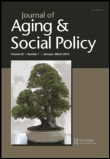
Journal of Aging & Social Policy
Scope & Guideline
Pioneering interdisciplinary research in aging and social well-being.
Introduction
Aims and Scopes
- Aging and Health Policy:
The journal investigates how health policies impact older adults, examining issues such as healthcare access, quality of care, and the effects of health-related policies on aging populations. - Social Support Systems:
Research on social support mechanisms for older adults, including informal caregiving, community-based services, and the role of family in elder care. - Economic Factors in Aging:
An exploration of economic issues affecting older adults, including poverty, financial security, and the impact of economic policies on aging individuals. - Cultural and Social Dimensions of Aging:
The journal addresses how cultural perceptions and social factors influence the aging experience, including studies on ageism, social participation, and community engagement. - Long-Term Care and Support Services:
Focus on long-term care policies, practices, and innovations aimed at improving the quality of life for older adults, including analyses of care systems and service delivery.
Trending and Emerging
- Impact of COVID-19 on Aging:
The pandemic has catalyzed a surge in research examining its effects on older adults, including health crises, isolation, and changes in care practices, highlighting the need for adaptable policies. - Digital Inclusion and Technology Use:
Increasing focus on how technology can support older adults, including telehealth, digital literacy, and the role of technology in enhancing social connections and care. - Loneliness and Social Isolation Interventions:
Growing interest in understanding and addressing loneliness among older adults, with studies exploring policy responses and community initiatives to mitigate isolation. - Policy Innovations for Aging Populations:
Research is increasingly directed towards innovative policy solutions that promote age-friendly environments, emphasizing sustainability and inclusivity. - Intersectionality in Aging Research:
Emerging studies are integrating intersectional approaches to aging, examining how various identities (e.g., gender, race, socioeconomic status) intersect to affect the experiences of older adults.
Declining or Waning
- Traditional Family Roles in Caregiving:
Research examining the role of family in caregiving has decreased, possibly due to the increasing recognition of diverse family structures and the rise of formal caregiving services. - Age-Based Stereotypes and Discrimination:
Although still relevant, studies focused solely on negative age-based stereotypes are becoming less frequent, as newer research emphasizes more holistic approaches to understanding aging. - Geographic and Urban Studies on Aging:
There appears to be a waning interest in studies that focus solely on geographic disparities in aging, as the field shifts toward more integrated approaches that consider social, economic, and health factors collectively. - Historical Perspectives on Aging:
Research that focuses heavily on historical contexts of aging and policy has seen a decline, as contemporary issues and immediate policy implications take precedence. - Niche Studies on Specific Aging Populations:
Publications focusing on very specific subgroups of older adults, such as certain ethnic or socio-economic groups, are less common, likely due to a broader focus on inclusive aging strategies.
Similar Journals
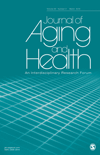
JOURNAL OF AGING AND HEALTH
Shaping the future of health for older adults.The JOURNAL OF AGING AND HEALTH, published by SAGE PUBLICATIONS INC, is a preeminent peer-reviewed journal dedicated to advancing research in the field of gerontology and related disciplines. With an impressive impact factor and ranked Q1 across multiple categories including Community and Home Care, Geriatrics and Gerontology, and Health (Social Science), this journal has established itself as a vital resource for academics, clinicians, and policymakers alike. Spanning over three decades of publication from 1989 to 2024, it serves as a platform for innovative research and multifaceted discussions on aging, health, and the interplay of social factors influencing the elderly population. The journal's rigorous standards for publication ensure high-quality contributions that are impactful and relevant, making it an essential read for those dedicated to improving the health and quality of life for older adults. Although it is not an open-access journal, it provides comprehensive insights that are critical to understanding the complexities of aging in today's society.
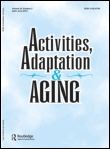
Activities Adaptation & Aging
Advancing knowledge at the intersection of aging and health.Activities Adaptation & Aging is a leading journal dedicated to the intersection of aging research, health professions, and gerontology, published by Routledge Journals, Taylor & Francis Ltd. With its origins dating back to 1981, this journal has established itself as a vital resource for scholars and practitioners alike, focusing on innovative approaches to enhance the quality of life for older adults. The journal’s inclusion in various prestigious Scopus ranks—such as being positioned in the 92nd percentile for Health Professions (miscellaneous)—reflects its significant impact in the field. Operating without open access, it provides essential insights and empirical research that are crucial for advancing knowledge and practices related to adaptation and engagement in aging. With a strong reputation built over the decades, Activities Adaptation & Aging continues to be an essential platform for disseminating research findings, fostering scholarly dialogue, and promoting effective interventions for aging populations.

JOURNALS OF GERONTOLOGY SERIES A-BIOLOGICAL SCIENCES AND MEDICAL SCIENCES
Pioneering Studies at the Intersection of Biology and MedicineJournals of Gerontology Series A: Biological Sciences and Medical Sciences, published by Oxford University Press Inc, stands at the forefront of aging research, bridging the gap between biological sciences and medical practices to address the complexities of gerontology. With an impressive impact factor reflecting its significant contribution to the field, this journal is recognized within the Q2 quartile in Aging and the Q1 quartile in Geriatrics and Gerontology for 2023, evidencing its high-quality scholarship and relevance. Researchers and professionals will find valuable insights through its comprehensive coverage of aging-related topics, informed by cutting-edge studies ranked among the top in their category—Rank #11 in Geriatrics and Gerontology and Rank #9 in Aging on Scopus. The journal aims to disseminate innovative research that can impact health care practices and enhance the quality of life in older populations. For those engaged in studies of aging, this journal offers a vital platform for sharing knowledge and advancing the understanding of biological and medical sciences as they pertain to gerontology.
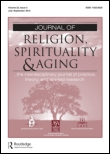
Journal of Religion Spirituality & Aging
Illuminating Spiritual Journeys in Later LifeThe Journal of Religion, Spirituality & Aging, published by Routledge Journals, Taylor & Francis Ltd, is a vital interdisciplinary platform that explores the intricate relationships between spirituality, religion, and the aging process. With an ISSN of 1552-8030 and an E-ISSN of 1552-8049, this journal critically addresses the evolving challenges and opportunities faced by older adults in the context of faith and spirituality. Covering a wide range of topics and methodologies, it has garnered a strong reputation in its field, achieving a Q1 ranking in Religious Studies and a Q3 ranking in Life-span and Life-course Studies for 2023. The journal serves as an essential resource for researchers, professionals, and students interested in gerontology, psychology, sociology, and related fields, fostering a deeper understanding of how spirituality can enhance the quality of life among older populations. While not an open-access journal, it continues to contribute significantly to the discourse on aging and spirituality through carefully curated scholarly articles, reviews, and studies.
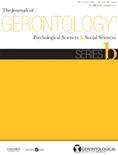
JOURNALS OF GERONTOLOGY SERIES B-PSYCHOLOGICAL SCIENCES AND SOCIAL SCIENCES
Exploring the Intersections of Psychology and GerontologyJOURNALS OF GERONTOLOGY SERIES B: PSYCHOLOGICAL SCIENCES AND SOCIAL SCIENCES, published by Oxford University Press Inc, stands as a premier scholarly outlet dedicated to the interdisciplinary study of aging, psychological sciences, and social relations. With a notable E-ISSN of 1758-5368 and a track record from 1995 to 2024, this journal has firmly established itself within the top quartile (Q1) across multiple domains including Clinical Psychology, Geriatrics, Gerontology, and Social Psychology. Its rigorous standards propel significant research that contributes to understanding the complexities of aging in contemporary society. Researchers and professionals engaged in these fields benefit from its high-impact publications, underscored by impressive rankings—such as 6th in Geriatrics and Gerontology—positioning it amongst the leading journals globally. While there are currently no Open Access options available, the journal remains a vital resource for advancing knowledge on life-span and life-course studies, ensuring that critical insights reach its dedicated audience of scholars and practitioners.
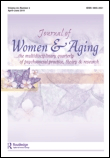
JOURNAL OF WOMEN & AGING
Innovating Perspectives on Aging and Gender StudiesJournal of Women & Aging, published by Routledge Journals, Taylor & Francis Ltd, stands as a pivotal resource in the interdisciplinary study of women’s health and gerontology. With a rich history since its inception in 1989 and an impressive convergence period extending to 2024, this journal addresses critical issues affecting women as they age, exploring topics that span from social policy to health care and psychological well-being. As a recognized publication in the fields of Gender Studies (Q2) and Geriatrics and Gerontology (Q3), it ranks favorably in Scopus, highlighting its commitment to advancing research and knowledge in these significant areas. Researchers, professionals, and students alike will find valuable insights within its pages as the journal seeks to promote understanding and foster discussion on the unique challenges and contributions of older women in society.
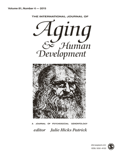
INTERNATIONAL JOURNAL OF AGING & HUMAN DEVELOPMENT
Transforming Understanding of Human Development Through ResearchInternational Journal of Aging & Human Development, published by SAGE Publications Inc, serves as a premier platform for interdisciplinary research in the rapidly evolving fields of aging, human development, and gerontology. With a history dating back to 1973, this journal has consistently provided valuable insights and rigorous scholarship, holding a Q3 ranking in Aging and Q2 rankings in Developmental and Educational Psychology as well as Geriatrics and Gerontology, highlighting its relevance and significance in these domains. The journal's commitment to advancing knowledge and fostering dialogue is further underscored by its recognition in various Scopus categories, positioning it among the influential publications in developmental psychology and geriatrics. Researchers, practitioners, and students alike will find a wealth of high-quality articles that explore the multifaceted experiences of aging and human development. For more information, inquiries can be directed to their office located at 2455 Teller Rd, Thousand Oaks, CA 91320.

Journal of Population Ageing
Connecting Research with the Challenges of AgeingThe Journal of Population Ageing, published by SPRINGER INT PUBL AG, stands as a prominent platform for the exploration and dissemination of research within the fields of demography, geography, and sociology. With an ISSN of 1874-7884 and an E-ISSN of 1874-7876, this journal navigates the complexities of population ageing, a vital topic as societies worldwide confront the implications of an ageing demographic. The journal boasts impressive Scopus rankings, including the 30th rank in Demography and a 78th percentile in Sociology and Political Science, emphasizing its significant role in academic discourse. It is highly regarded in its Q2 category quartiles for Demography, Geography, Planning and Development, and Sociology and Political Science, showcasing its relevance and scholarly impact. Although not an open-access publication, the journal's carefully curated articles aim to inform and advance knowledge, making it an invaluable resource for researchers, professionals, and students invested in understanding the multifaceted challenges associated with an ageing population. With its comprehensive scope and commitment to quality, the Journal of Population Ageing continues to contribute meaningfully to the evolving conversation on demographic trends and their societal implications.
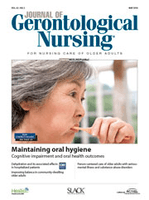
Journal of Gerontological Nursing
Advancing Care for Aging LivesThe Journal of Gerontological Nursing, published by SLACK INC, is a leading peer-reviewed journal dedicated to advancing the field of gerontological nursing through innovative research, clinical practice, and educational advancements. Since its inception in 1975, this journal has become a crucial resource for researchers, healthcare professionals, and students interested in the care and management of older adults. With an impact factor that reflects its significance within the disciplines of gerontology and nursing (Category Quartiles: Q3 in Gerontology and Q3 in Nursing), it serves as a platform for disseminating vital findings, best practices, and evidence-based approaches aimed at improving the quality of life for the aging population. While the journal maintains a print-only format, its content is invaluable for those looking to stay ahead in the rapidly evolving landscape of gerontological care. As it continues to publish until 2024, the Journal of Gerontological Nursing invites contributions that foster dialogue and innovation within this essential area of healthcare.

npj Aging
Connecting scientists and clinicians in the study of aging.npj Aging, published by Nature Publishing Group, is a pioneering journal dedicated to advancing our understanding of the biological, clinical, and social aspects of aging. With an E-ISSN of 2731-6068, this open-access journal aims to foster innovative research and interdisciplinary dialogue among scientists, clinicians, and policy-makers. As of its inception in 2023, the journal has quickly established itself within the scholarly community, ranking 15th in Medicine (Geriatrics and Gerontology) and 12th in Biochemistry, Genetics, and Molecular Biology focusing on Aging, reflecting a strong percentile standing in both categories. The journal provides a platform for disseminating important findings that address the complexities of aging, ensuring accessibility for a broader audience. Located at the Macmillan Building, 4 Crinan St, London, England, npj Aging aspires to be an essential resource for those seeking to enhance their understanding and contribute to the field of gerontology.